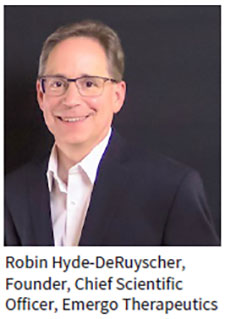Emergo Therapeutics Inc., a Durham, N.C.-based startup that raised a $12 million series A last year, has successfully completed a phase IIa trial demonstrating positive data for its lead candidate, an oral formulation of norketotifen, in 36 people with allergen-induced allergic rhinitis. Positive results of the study provide it a stepping stone to its next goal, demonstrating efficacy in community-based flu and flu-like illness.
Top-line results of the double-blind, randomized challenge trial showed participants treated with a single dose of the drug experienced a statistically significant reduction in total nasal symptom score within six hours post-dose.
 "The alleviation of allergy symptoms are due to the reduction of cytokine secretions from mast cells," Emergo's founder, Robin Hyde-DeRuyscher, told BioWorld. "That's exactly what we want to do in influenza; that is, keep mast cells and other cells that produce cytokines from releasing additional cytokines," he said.
"The alleviation of allergy symptoms are due to the reduction of cytokine secretions from mast cells," Emergo's founder, Robin Hyde-DeRuyscher, told BioWorld. "That's exactly what we want to do in influenza; that is, keep mast cells and other cells that produce cytokines from releasing additional cytokines," he said.
Next up, in the fourth quarter, Emergo is planning to run a phase IIb community trial testing norketotifen vs. placebo in people with influenza, respiratory syncytial virus, adenovirus or other viral infections. If the results of that trial are positive, it will look to partner with a bigger company to move the program ahead.
Ketotifen, a histamine H1 receptor antagonist and mast stabilizer, is widely available in eye drops for the treatment of asthma and allergic conditions. But its principal active metabolite, norketotifen, hasn't been approved for any indication yet. The idea of applying it in flu arose out of work by Hyde-DeRuyscher and his wife as they sought a way to help alleviate symptoms of a medical condition their daughter was experiencing. As they worked, they homed in on the role of overactive mast cells as a key part of the problem.
They conceived of Emergo in early 2016 when "we realized that there was an opportunity to really target these cells in a much broader range of indications," Hyde-DeRuyscher, now the company's chief scientific officer, told BioWorld. His wife remains a consultant to the company.
Emergo gained financial traction when Hyde-DeRuyscher connected with serial entrepreneur Moise Khayrallah, now CEO of the company. Earlier, Khayrallah co-founded and led Quatrobio LLC, Aerial Biopharma LLC, Neuronex Inc., Addrenex Pharmaceuticals Inc. and Alius Pharma LLC. Early on, in summer 2017, they secured a $75,000 company inception loan from the North Carolina Biotechnology Center to support preclinical testing in animals.
With early data in hand, Emergo's team quickly grabbed the interest of additional investors, including REX Health Ventures, the venture capital arm of the UNC REX Healthcare hospital system, which went on to lead the company's $12 million series A financing. Other major investors in the series A included Wolfpack Investor Network, the Carolina Angel Network and the Venture Capital Multiplier Fund at Hatteras Venture Partners.
"Flu has some treatments out there, but they are not terribly effective," said Hyde-DeRuyscher, a virologist by training. Tamiflu (oseltamivir, Roche Holding AG) and the more recently approved Xofluza (baloxavir marboxil, Roche and Shionogi & Co. Ltd.) might result in symptoms taking "a day off" out of the typical 10- to 14-day course of the illness, but even that impact can take days to kick in, he said. "We don't think we're going to impact flu symptoms in a couple of hours, but we're hoping we have a much faster impact," he said.
